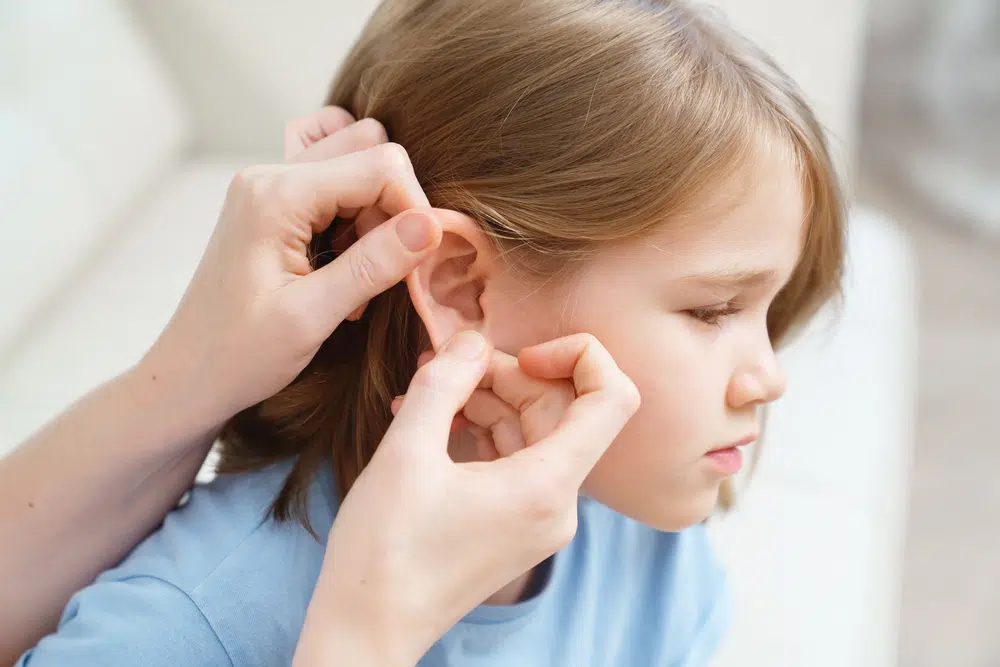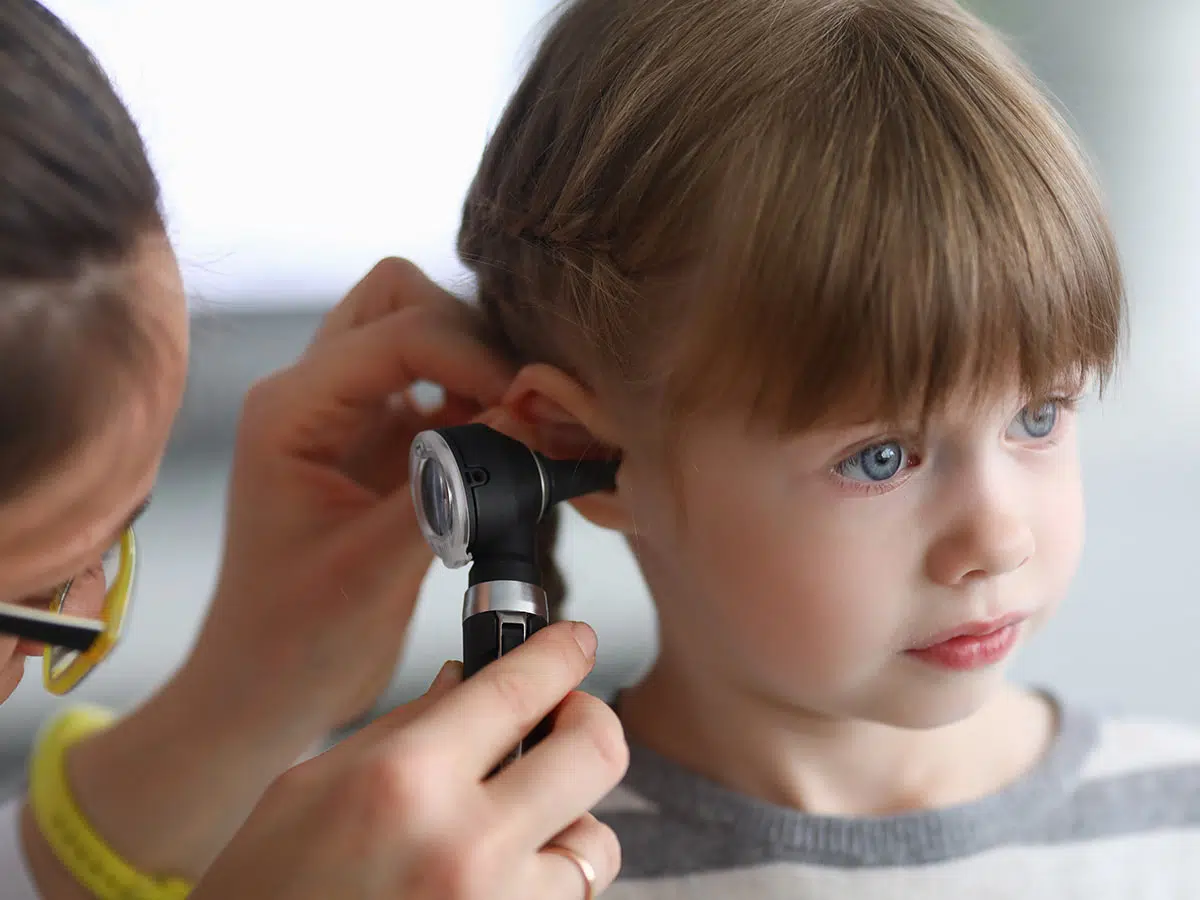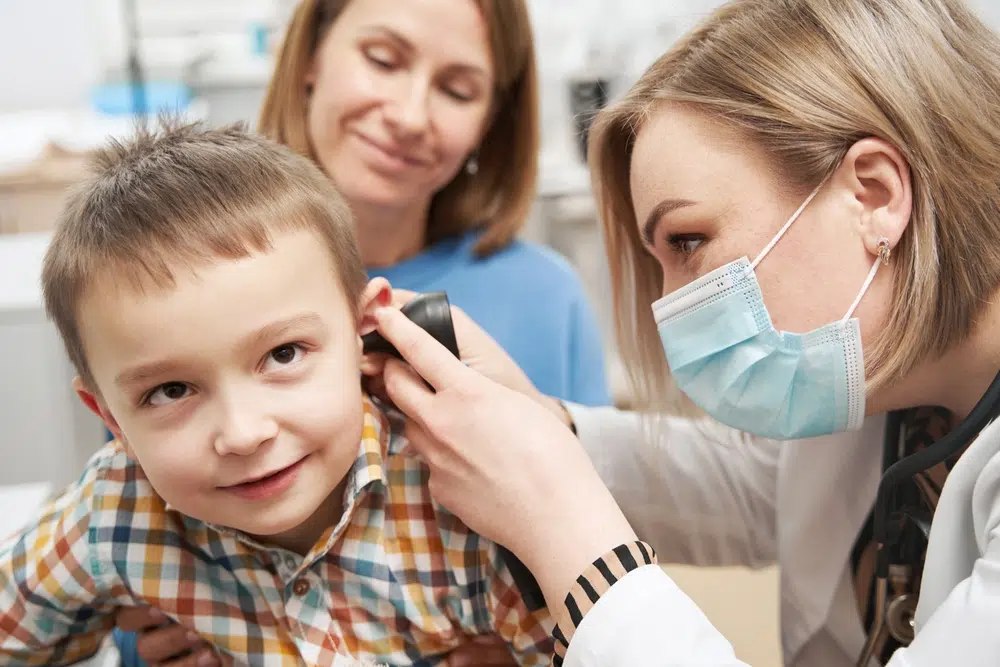Ear infections are a common health issue for many children. In fact, 5 out of 6 children will experience at least one ear infection by their third birthday, according to the NIDCD. Fortunately, various home remedies can help alleviate the symptoms and promote healing.
The healthcare professionals at Penn Medicine Becker ENT & Allergy can prevent and treat ear infections by providing guidance and treatment plans for your child. This article aims to provide valuable information on the causes of ear infections in kids and the benefits of using home remedies as a treatment option.

Managing Ear Infections in Children with Home Treatments
- Ear infections in kids can lead to symptoms like ear pain, difficulty hearing, and a feeling of fullness in the ear.
- Common causes of ear inflammation include blockages in the Eustachian tubes and viral infections.
- Effective home remedies for ear infections in kids include using a warm compress to alleviate ear pain and applying garlic oil for its antimicrobial properties.
- Over-the-counter pain relievers can help ease the discomfort associated with ear inflammation, while keeping a child hydrated assists in overall recovery.
- When using home remedies, it’s important to monitor the child’s condition closely and consult a healthcare provider if symptoms persist or worsen.
Common Reasons Your Kids May Get an Ear Infection

Ear infections in children can be caused by various factors, including:
- Bacterial or viral infections: In many cases, ear infections are a result of a cold or respiratory infection that spreads to the middle ear. Common bacteria responsible for ear infections include Streptococcus pneumoniae and Haemophilus influenzae, while viruses such as respiratory syncytial virus (RSV) and influenza can also cause it
- Allergies: Allergic reactions can lead to inflammation and fluid buildup in the Eustachian tubes, increasing the risk of ear infections.
- Exposure to tobacco smoke or air pollution: These environmental factors can irritate and inflame the Eustachian tubes, making it more difficult for fluid to drain from the middle ear.
- Changes in altitude or air pressure: Rapid changes in altitude or air pressure, such as during air travel or driving through mountains, can cause Eustachian tube dysfunction and contribute to ear inflammation.
Popular Home Remedies for Ear Infections in Kids
Several home remedies are available that can help alleviate ear infection symptoms in children. Some popular options include:
Warm and Cold Compress
Alternating between warm and cold compresses can provide significant relief for ear pain. Start with a warm compress by soaking a clean washcloth in warm water, wringing it out, and gently pressing it against your child’s ear.
This helps reduce inflammation and discomfort. After applying the warm compress for a few minutes, switch to a cold compress.
Apply another clean washcloth soaked in cold water in the same manner. This change in temperature helps further reduce swelling and can soothe the pain effectively. Using a warm compress is a simple and effective method of ear pain relief for kids.
Over-the-Counter Pain Relievers
Children’s acetaminophen or ibuprofen is effective in reducing pain and fever. These over-the-counter pain medications should always be used according to the appropriate dosage, and it’s important to consult your pediatrician for advice, especially if symptoms persist.
Garlic Oil Drops
Garlic oil is naturally antibacterial and can be effective against bacterial infections in the ear. Warm a few drops of garlic oil and apply them around the external part of the ear canal with a dropper, but avoid inserting directly into the ear.
Elevating the Head
To help fluids drain from the middle ear and reduce pressure and pain, keep your child’s head elevated while they sleep. This can be achieved by using extra pillows to maintain a comfortable upright position.
Hydration
Encourage your child to drink plenty of fluids. Staying hydrated helps thin the mucus, which promotes drainage from the Eustachian tubes, alleviating pressure in the ears.
Ginger
Ginger is an excellent natural remedy due to its potent anti-inflammatory properties. Applying ginger juice around the outer ear canal can help reduce pain. To avoid irritation, ensure that it does not enter the ear canal.
Saltwater Gargle
For older children, gargling with salt water can relieve a sore throat linked to ear infections and may help prevent additional infections that could exacerbate the ear condition.
Hydrogen Peroxide Drops
A few drops of hydrogen peroxide in the affected ear can help kill bacteria and promote fluid drainage. Always use only a small amount and consult with a healthcare provider beforehand to confirm it’s safe for your child.
Antibiotic Eardrops
If your child’s ear infection involves the outer ear, antibiotic eardrops prescribed by a healthcare provider can be effective. These are specifically used to target bacterial infections and should be administered as directed.
Secure Your Safe Treatment Experience with Penn Medicine Becker ENT & Allergy
Join our satisfied clients who’ve experienced safe, effective treatments.
Precautions When Using Home Remedies for Ear Infections in Kids
While home remedies can be helpful in treating ear inflammation or infections, it’s essential to take certain precautions to ensure your child’s safety:
- Consult a healthcare professional before using any home remedies, especially if your child has a history of allergies or other medical conditions.
- Do not insert any objects or liquids directly into the ear canal, as this can cause further damage or infection.
- If your child’s symptoms worsen or do not improve within 48 hours, seek medical advice.
- Always follow the recommended dosage instructions for over-the-counter medications and consult your child’s pediatrician if you have any concerns.
Symptoms of Ear Infections in Kids
Children with ear infections, particularly middle ear infections, may exhibit a variety of symptoms. Here are some common signs to watch for:
- Ear pain or discomfort, which may worsen when lying down
- Tugging or pulling at the affected ear
- Difficulty hearing or responding to sounds
- Fever
- Irritability or fussiness
- Trouble sleeping
- Loss of appetite
- Fluid drainage from the ear
It’s important to monitor your child’s symptoms and seek medical attention if they worsen or do not improve within 48 hours.
Diagnosing Ear Infections in Kids
If you suspect your child has an ear infection, it’s essential to consult with a healthcare professional for an accurate diagnosis. A pediatrician or ear, nose, and throat specialist will typically perform a physical examination and use an otoscope to look inside the child’s ear. This allows them to assess the presence of inflammation, fluid buildup, and any signs of infection.
In some cases, additional tests may be performed, such as tympanometry to measure the movement of the eardrum or a hearing test to evaluate any potential hearing loss. Proper diagnosis is crucial for determining the appropriate treatment plan for your child’s ear infection.

When to Seek Medical Attention for Ear Infections in Kids
While home remedies can help with mild cases of the common type of ear infection, there are times when it’s essential to seek professional medical care for your child. Here are the situations that require immediate attention from a healthcare professional:
- Persistent or Worsening Symptoms: If your child’s ear infection symptoms don’t improve or get worse within 48 hours, it’s important to see a doctor.
- High or Ongoing Fever: A fever higher than 102°F (38.9°C) or one that continues for more than two days indicates a need for medical evaluation.
- Severe Ear Pain: If your child experiences intense ear pain that home remedies or over-the-counter medications can’t alleviate, professional medical help is necessary.
- Abnormal Fluid Drainage: Fluid draining from the ear that is bloody or pus-filled is a serious concern that needs immediate medical attention.
- Signs of Dehydration: Dry mouth, sunken eyes, or a significant drop in urine output are all signs of dehydration and require a healthcare provider’s intervention.
- Hearing Issues: Difficulty hearing or sudden mild hearing loss can occur with ear infections and should be checked by a professional.
- Recurrent Ear Infections: If your child frequently suffers from ear infections, your doctor may discuss long-term solutions, such as ear tubes, to help prevent future episodes.
If you are unsure about your child’s condition or have concerns about their symptoms, it’s always best to consult with a healthcare professional. Prompt medical attention can help prevent complications and ensure the most effective treatment for your child’s ear infection.
How to Prevent Ear Infections in Your Child
Prevention is key to keeping your child healthy and avoiding the need for medical intervention. Here are some strategies to help prevent and manage ear infections in children:
- Encourage good hand hygiene: Frequent handwashing can help prevent the spread of germs that cause ear infections.
- Keep up to date with vaccinations: Ensure your child receives all recommended vaccinations, including the pneumococcal vaccine and annual flu shots, as these can help protect against some of the bacteria and viruses that cause ear infections.
- Avoid exposure to secondhand smoke: Tobacco smoke can irritate the Eustachian tubes and increase the risk of ear infections.
- Breastfeed infants if possible: Breastfeeding provides antibodies that can help protect against ear infections. Aim to breastfeed for at least six months, if possible.
- Manage allergies: If your child has allergies, work with your healthcare provider to develop a plan to manage them, as allergy symptoms can contribute to Eustachian tube dysfunction and increase the risk of ear infections.
- Limit pacifier use: Prolonged pacifier use has been linked to an increased risk of ear infections in young children. Consider limiting pacifier use to bedtime or gradually weaning your child off the pacifier altogether.
- Address Earwax Buildup: Too much earwax can block the ears and lead to infections. If you think your child has earwax buildup, ask a healthcare provider for the safest way to handle it.
- Be Mindful of Water in the Ears: Water left in the ear after swimming can cause infections. Encourage your child to dry their ears thoroughly after swimming or bathing.
Implementing these prevention and management strategies can help reduce your child’s risk of ear infections and promote their overall health and well-being.
Why Choose Penn Medicine Becker ENT & Allergy for Your Child’s Ear Care?
When it comes to treating ear infections, at-home remedies can provide comfort, but expert evaluation is often crucial — especially for young children. At Penn Medicine Becker ENT & Allergy, we combine compassion, advanced diagnostics, and personalized care to help your child find real, lasting relief.
Here’s why parents trust us:
- Pediatric Expertise: Our ENT specialists are highly experienced in diagnosing and treating ear infections in infants, toddlers, and older children.
- Comprehensive Care: From accurate diagnosis to customized treatment plans, we address both the immediate infection and any underlying causes like allergies or chronic ear issues.
- Family-Centered Approach: We prioritize clear communication and education, making sure you feel confident and informed every step of the way.
- Access to Advanced Treatments: If needed, we offer in-office procedures and long-term solutions to prevent recurring ear infections.
Your child’s hearing and comfort are too important to leave to chance. Trust the experts at Penn Medicine Becker ENT & Allergy to guide your family with skill and care. Don’t hesitate to contact us.

